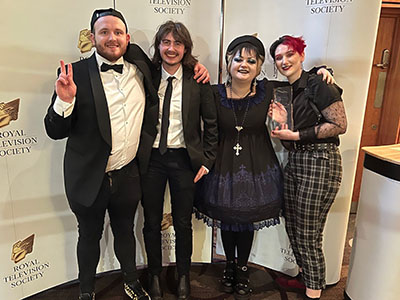Course overview
MA 2D Animation and Stop Motion
Arran Bull talks about his experience of studying a master’s in 2D animation and stop motion at Teesside
If you want to write, design and animate a short film, taking it from initial concept through to festival-ready completion, this is the course for you. Learn how to pitch your script to industry professionals and funding bodies while critically engaging with animation through a range of theoretical frameworks.
Semester 1 focuses on writing, pitching and designing production materials. Explore the anatomy of animation, gaining insight into the layers of production and refining a considered creative approach.
Semester 2 moves into production. Work in either 2D or stop motion using dedicated studio spaces, technical labs and workshops. Develop skills in sound, editing, performance and direction, supported by experienced staff and technical specialists - ready to release the final film.
Ranked 20th in the world in the Animation Career Review International Animation School Rankings 2025. (Top 50 International Animation Colleges – formal degree. 207 colleges considered.) Find out more at tees.ac.uk/source.
Course details
Course structure
Core modules
You deconstruct and analyse all aspects of films and animations that make up the visual language used to influence the audiences understanding. You will be expected to analyse and critically discuss many genres and formats including short film, feature film, and both live action and animation. This module also introduces you to other relevant concepts and associated theories such as psychoanalytical theory, film theory, as well as establishing a social, cultural and intellectual context for production work.
Working as a group you explore and produce a short animation sequence or set of sequences, either using 2D, stop-motion, or an appropriate animation technique (or combination). You are introduced to the principles of performance for animation, using dialogue, sound creation and synchronisation techniques. This is your opportunity to experiment with technical and visual aspects of your final films.
Using the pre-production materials already produced throughout the course, you create your final short film animation or TV pilot.
Students will be expected to develop and demonstrate an understanding of the core broadcast skills, media workflows, studio etiquette, technologies and production methods as used by a contemporary 2D and/or stop motion animation studio together with demonstrating an understanding of intellectual property rights and contracts appropriate to enable career progression.
You study and develop an original visual style for your animation. You look at case studies of contemporary directors and gain an understanding of the art department’s role within the production process.
You write and develop a screenplay for a film/animation or TV series pilot. You will learn how to write and present a script idea in a competitive environment.
Modules offered may vary.
How you learn
Animation is an intensive discipline, you are focused on creating an animated short from the beginning. You are supported by a teaching team who have backgrounds in 2D and stop motion animation as well as fine art installation. In addition, the course is supported by dedicated stop motion and 2D animation spaces as well as well-equipped workshops with specialist technician support to help you in your model, puppet and set making.
How you are assessed
You are assessed on your subject-specific knowledge, cognitive and intellectual skills and transferable skills applicable to the workplace. You are given formative assessment throughout the programme, typically given during lectures and tutorials.
Entry requirements
At least a UK 2.2 honours degree in animation or equivalent.
Other first degree subjects may be accepted when combined with a portfolio of creative work at an acceptable standard.
Get some hints and tips on how to prepare a portfolio
Students with a degree awarded outside the UK must also meet the University's minimum English language requirements.
For general information please see our overview of entry requirements
International applicants can find out what qualifications they need by visiting Your Country
Employability
Career opportunities
You have access to the School Students Future programme to develop your graduate employability skills. This involves a series of activities delivered to all students, year groups, subject cohorts or subject groups and includes industry speaker talks, extra-curricular industry challenges and company visits. The programme is co-ordinated by a team of academic staff, representing each subject area, who are actively working with our industry partners and other external organisations to ensure you are equipped with the skills required for the changing needs from industry.
Information for international applicants
Qualifications
International applicants - find out what qualifications you need by selecting your country below.
Select your country:
Useful information
Visit our international pages for useful information for non-UK students and applicants.











